Iran's Ghalibaf Re-elected Parliament Speaker Despite Challenge
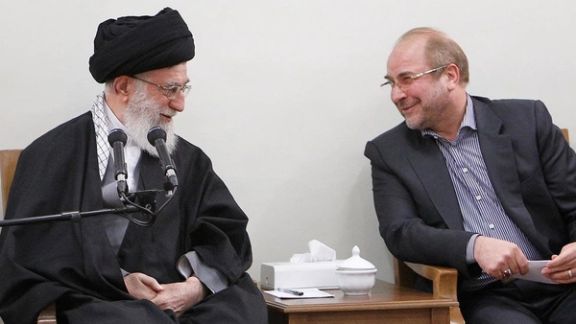
Veteran politician and former IRGC general Mohammad Bagher Ghalibaf was re-elected as Speaker of Iran’s new parliament on Tuesday, after the March 1 low-turnout election.

Veteran politician and former IRGC general Mohammad Bagher Ghalibaf was re-elected as Speaker of Iran’s new parliament on Tuesday, after the March 1 low-turnout election.
Ghalibaf faced attacks by hardliners in the past few weeks, who were expected to challenge his bid for re-election as Speaker. However, with 198 votes out of 290 parliamentary seats, he secured a second term.
The election came less than 10 days after President Ebrahim Raisi was killed in a helicopter crash, which rattled the upper echelons of the clerical government in Iran. Supreme Leader Ali Khamenei in speeches following Raisi’s death had called for solidarity among regime loyalists.
Ghalibaf’s only serious challenger, Mojtaba Zolnur, a hardline cleric received 60 votes. Observers had predicted that Khamenei would back Ghalibaf’s re-election as Speaker, since he is a reliable loyalist and independent of the ultra-conservative Paydari (Steadfastness) Front.
Ghalibaf's name is also being mentioned as a possible candidate for the snap presidential election scheduled for June 28 to choose a successor to Raisi. He has run for the presidency in the past although he has not announced his intentions for this round.
Hardliners have dominated the Islamic Republic’s parliament since 2020, when the Guardian Council, controlled by Khamenei, barred hundreds of other regime insiders from running in the previous elections. The March 1 vote witnessed the repeat of the 2020 mas disqualifications, leaving mostly hardline loyalists to compete over the parliamentary seats.
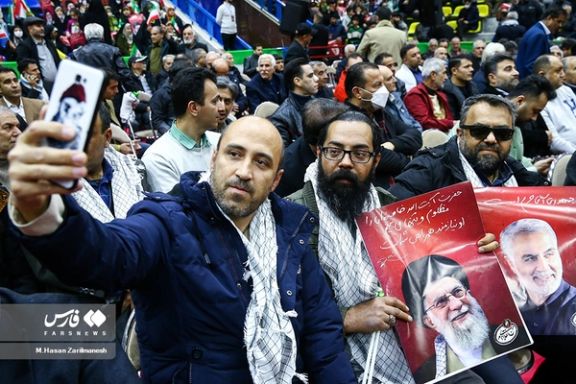
Hardliners, hardliners and more hardliners are going to be the likely choices Iranians will have to choose from when it comes to next month’s snap election after the death of their president in a helicopter crash.
“It's just a contest between different hardliners, and they're all devoted to [Supreme Leader Ali] Khamanei,” said Arash Azizi, Iran analyst and author of ‘What Iranians Want: Woman, Life, Freedom.
Azizi said an important question is which hardliners will run and which organizations will support it, and if centrists and so-called reformists are allowed to run, who will it be and how will everyday Iranians react given epic low voter turnouts in the last few years?
In March, less than 10% of Iranians voted in parliamentary by-elections. Many observers believe real turnout in the last two previous elections has been around 20-30 per cent.
As the registration for Iran’s presidential elections draws near on May 30 and closes on June 3, Azizi ’s list of potential candidates are as follows:
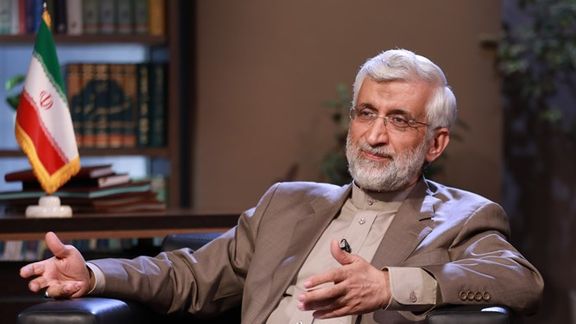
Saeed Jalili: He’s an ultra-hardliner who confirmed his candidacy this weekend. According to Azizi, he is unpopular and "very widely hated.” Azizi described his main path to be ordering the Islamic Revolutionary Guard Corps (IRGC) to beat up women on the streets of Iran. Jalili was the secretary of the National Security Council between 2005 to 2013 and was the chief nuclear negotiator. Azizi said “he was an absolute disaster in that position.” With a PhD on diplomacy of the Prophet Mohammad, Azizi said Jalili was not the ‘career diplomat’ type to get the job done.
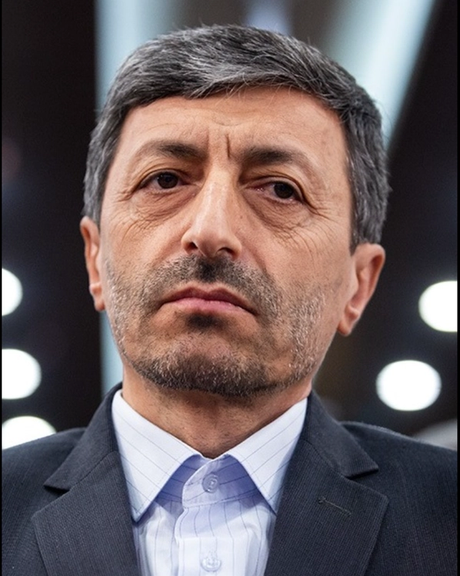
Parviz Fattah: Azizi said he was the head of the Execution of Imam Khomeini’s Orders Headquarters. “They're called parastatal foundations. It is an organization, whose head is appointed by Khamenei. And they were built by expropriating the wealth of, you know, Iranians before 1979. And they use that to do all sorts of things,” said Azizi. He said Fattah’s base is with the IRGC and military caste.
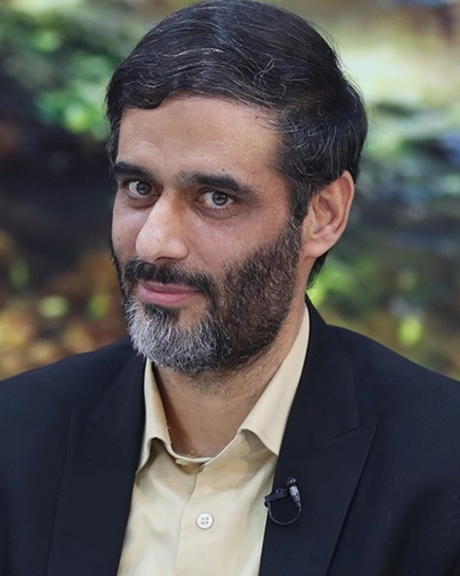
Saeed Mohammad: Azizi described him as being similar to Fattah and came from a background in the IRGC. He’s much younger than other potential candidates being in his 50s and he tried to run in 2021 but was barred from the Guardian Council.
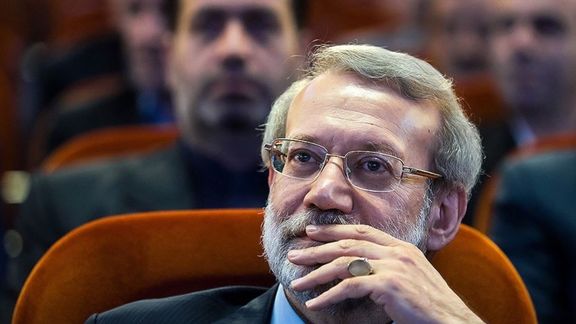
Ali Larijani: Azizi calls him a “Centrist conservative” only because he supported so-called centrist former President Hassan Rouhani in the past election. He’s the former speaker of the parliament and hails from the religious center of Qom. “He is also currently from the foundation of the regime. His brother was the head of the Expediency Council. Sadeq Larijani, who was the former head of the judiciary, a potential kind of a Supreme Leader even at some point, one of his other brothers, was a key sort of people person in the Iranian Foreign ministry for many years, the key clerical family that had been sidelined by the regime in recent years,” added Azizi.
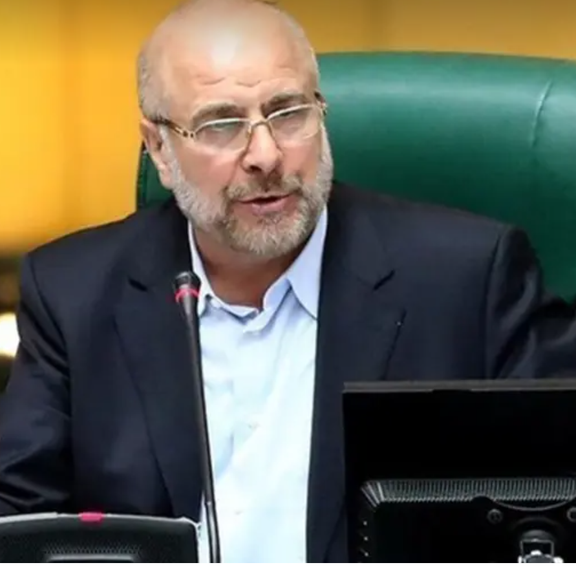
Mohammad Bagher Ghalibaf, is the current Parliament Speaker. Azizi said Ghalibaf is “also a conservative hardliner in some way, but known to be much more technocratic than ideological.” According to Azizi’s sources there was a meeting between Iran’s Supreme Leader and Ghalibaf that did not go well. He said he has a lot of political ambition with a deep IRGC past.
Freelance journalist and former senior analyst with the US government Behrouz Turani believes the conservative camp is going to win the election with the full support of the Interior Ministry, the Guardian Council and the Supreme leader.
“Iranians have not been going to the polls to vote, at least since 2021, because they don't have anyone to vote for. That is, the main problem about the Iranian election. It's not representative. It's not fair. It's not free. It generally depends on what the political system and what the Supreme Leader want from the election,” said Turani.
He said that no one in Iran can directly elect their president, instead “the biases and preferences for the Guardian Council, which is, supervised by, Supreme Leader Ali Khamenei,” decide how things will go.
The elections are happening during an economic crisis as Turani put it, “the biggest crisis in the lifetime of the Islamic Republic in the past 45 years.”
“This election is tremendously important for the government, but the nation has shown during the past maybe eight years even that they have no interest whatsoever in any kind of elections because they, are led by the government itself to believe that, no president, no parliament in Iran is going to serve their interest,” Turani told Iran International.
He said if Larijani is allowed to run for president there may be some sort of chance for the US and Iran to resume ties and that would help with what Turani described as a ‘catastrophic’ economic situation in the country.
Turani pointed out the timing of Iran’s elections are critical with the US elections only a few months away. Azizi said even political commentators in Iran have said whoever takes charge needs to be able to come up against Donald Trump if he is elected president.
"Tehran is definitely thinking about Trump," said Azizi.
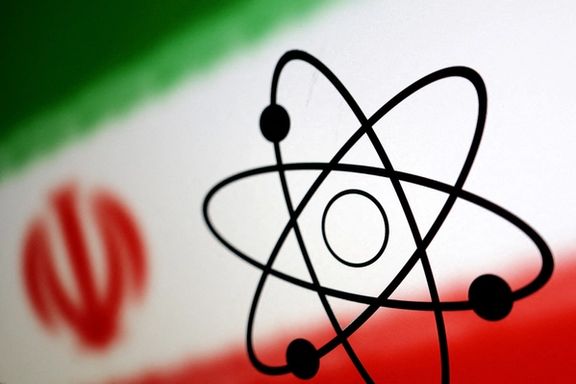
The UN’s nuclear watchdog warned on Monday that Iran is continuing to enrich uranium to near weapons-grade levels.
The International Atomic Energy Agency (IAEA) said that Iran's estimated stockpile of enriched uranium had reached more than 30 times the limit set out in the 2015 nuclear agreement between Tehran and world powers.
According to a confidential IAEA report, which Iran International has read and reviewed, as of May 11, Iran has 142.1 kilograms of uranium enriched up to 60 percent which is an increase of 20.6 kilograms since that last report by the UN watchdog in February.
“It's a pretty grim picture of Iran's advancing nuclear program,” said Andrea Stricker, the Deputy Director of the Foundation for Defense of Democracies (FDD)’s Nonproliferation and Biodefense program.
Stricker told Iran International that Iran is getting dangerously close to gaining nuclear weapons and time is of the essence.
“Now they [Iran] have enough, at the 60% level, to make almost four nuclear weapons. And that material can be used directly in a nuclear device, if a country chose, and then there's enough for probably more than 13 weapons overall, and they can fabricate that into weapons grade uranium within around five months.”
“Then it would take additional time, at least six months for them to be able to fabricate that fuel into a crude nuclear device. And then even longer, perhaps more than a year, to be able to put it on a ballistic missile,” said Stricker.
“Basically, once you get to 20%, you have done most of the work on a technical level, and then it's only a matter of days, for example, to transfer 60% enriched uranium to weapons grade. And that's what we're looking at, a very short breakout time, perhaps less than seven days to make the weapons grade uranium for one bomb,” she added.
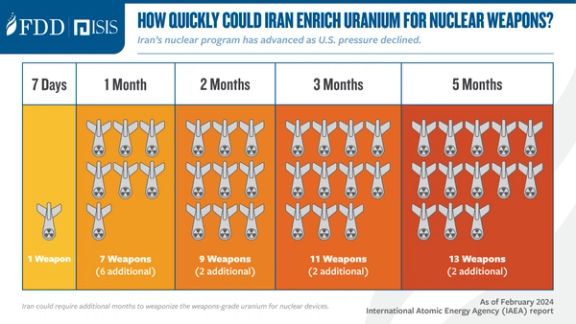
Could Iran acquire a bomb?
Patrick Clawson, a Research Counselor at The Washington Institute, said the latest developments are disturbing.
"It's very discouraging because, a year ago, the United States government thought that it had reached an informal agreement with Iran where Iran would essentially stop its production of 60% enriched uranium in return to the United States not making too much effort to stop Iranian sales of oil to China," said Clawson.
The nuclear watchdog's warning comes in the backdrop of escalating tensions in the region. Just last month Iran and Israel, for the first time, conducted direct strikes on each other's territories.
"The International Atomic Energy Agency's chief, Mr. Grossi, says that Iran could produce the fissile material for a bomb in about a week," said Clawson.
For a bomb delivered by a missile, however, Clawson said it could take up to a year.
"A year is not that long," he added.
Stricker believes Iran's advancements could empower the Islamic Republic by giving it a “nuclear deterrent," allowing it to “pursue arming its proxies to have them destabilize other governments and countries, and launch attacks.”
Shifting paradigms in the Middle East
According to a report released Monday by the Wall Street Journal, the Biden administration is pressing its European allies not to confront Iran on its nuclear program.
The report said the US was arguing against an effort by Britain and France to disapprove Iran at the IAEA's member state board.
Iran insists that its nuclear program is for peaceful purposes. Rafael Mariano Grossi, the IAEA chief, has previously warned the UN agency cannot guarantee that none of Iran’s centrifuges may have been used for clandestine enrichment.
Former President Donald Trump pulled out of the Iran nuclear deal in 2018. Under the original deal, struck in 2015 by the Obama administration, Iran was allowed to enrich uranium only up to 3.67% purity, maintain a stockpile of about 300 kilograms and use only very basic IR-1 centrifuges.
In mid-May, Kamal Kharrazi, a senior advisor to Iran's ruler Ali Khamenei, said that Iran would be left with no option than to change its nuclear doctrine if Israel threatened its nuclear facilities amid heightened tensions.
The US State department deputy spokesperson said, in response, when asked about Kharrazi's comments during a press briefing, that the US would not allow Iran to build a nuclear bomb.
Iran's foreign ministry spokesperson later said in Tehran that Kharrazi's remarks were not the official position of the Islamic Republic.
There is great risk at one point, according to Clawson, that the Islamic Republic decides the time is right for Iran to move forward.
"If Iran were to explode a nuclear device, much less to test an actual bomb that would change the Middle East, and in particular, it would put a lot of pressure on a place like Saudi Arabia, whose leaders have for years, said to the United States, If Iran gets a bomb, we'll get a bomb," he said.
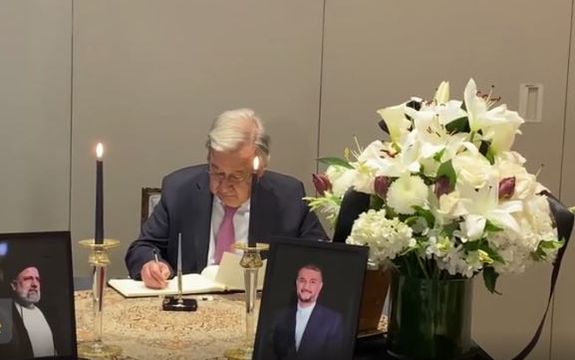
The Norway-based Victims Families for Transitional Justice has condemned the United Nations General Assembly (UNGA) for its honoring of the late Iranian President Ebrahim Raisi, infamously dubbed the "Butcher of Tehran".
The tribute has sparked global outrage, seen as an insult to the countless victims of Raisi’s oppressive rule under the Islamic rule of Iran.
Raisi, a hard-liner and protégé of Supreme Leader Ali Khamenei, was implicated in the mass execution of thousands of political prisoners in 1988 and was instrumental in the suppression of dissent throughout his tenure leading to the deaths of hundreds of protesters in the wake of the 2022 uprising.
As head of the Iranian judiciary and later as president, his administration was marked by crackdowns on human rights, where hundreds of dissidents were detained, and many subjected to torture and ill-treatment.
"Offering condolences and tributes to a regime notorious for its systemic human rights abuses, support of terrorism, and suppression of dissent, essentially legitimizes its heinous actions," stated the group from Norway.
The organization highlighted that under Raisi’s leadership, human rights violations persisted, including the suppression of the Woman, Life, Freedom movement, resulting in over 20,000 arrests and the deaths of more than 500, including children. These atrocities were confirmed by a UN fact-finding mission in March as crimes against humanity.
The group's March letter to the Special Rapporteur on the Situation of Human Rights in Iran also detailed ongoing violations, including the destruction of graves and harassment of families of political prisoners, urging immediate international intervention.
Last year the UN revealed that Iran had executed record numbers of citizens in 2023, voting at least 834, while inviting Iran to chair a human rights dialogue in November.
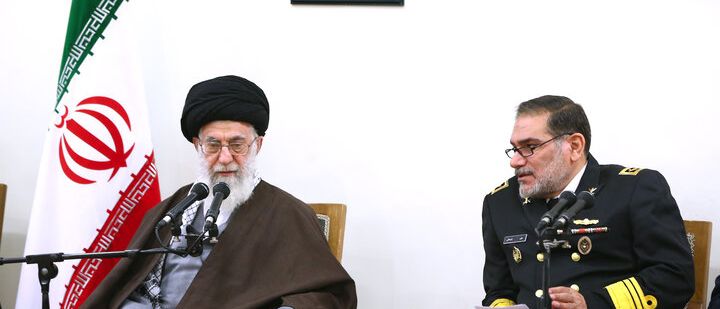
As Iran has barely begun preparations for the June 28 presidential vote, some sources have reported that the nuclear negotiations have been entrusted to Ali Shamkhani, a veteran insider and advisor to Ali Khamenei.
These unofficial reports seem to be close to reality, given the ambiguous response from the Foreign Ministry spokesperson on Monday.
At this stage it is difficult to judge the significance and purpose of this move. It could be an attempt by Khamenei to delegate the talks to an experienced deal maker, not knowing what the elections will bring, or a sign of a possible intention to achieve some progress.
Tabnak news website in Tehran has claimed that Shamkhani was actually put in charge of the talks approximately two months ago. The website speculated that leaking the news now might be a signal of serious talks. However, an analyst suggested to Iran International that either Shamkhani or his associates are now leaking this information ahead of the presidential election possibly to enhance Shamkhani’s stature as a possible presidential candidate.
Foreign Ministry spokesman Nasser Kanaani responded to a reporter's question about the unofficial reports about Shamkhani’s alleged appointment, stating, "I have no specific comment on this matter.” He immediately added that Tehran’s negotiating team has advanced the negotiations in coordination with and under the supervision of the high-ranking institutions of the regime, “and all capacities within the governance framework have been utilized in this context."
Many domestic media outlets have interpreted the ambiguous response from the Foreign Ministry spokesperson as a tacit confirmation of the matter.
Some media have viewed this change as a reaction to the death of Ebrahim Raisi and Hossein Amir-Abdollahian in the helicopter accident, as a force majeure to deal with the vacuum.
Yesterday, Hadi Mohammadi, an Iranian journalist wrote in a post on the X platform that the responsibility for the nuclear negotiations has been handed over to Shamkhani.
The Guardian also reported this news, stating that Rafael Grossi, Director General of the International Atomic Energy Agency, is attempting to negotiate improved access to Iran's nuclear sites. However, this process has slowed down due to Raisi's death. The significance of this matter is underscored by the fact that nuclear negotiations have been entrusted to Khamenei's advisor, Shamkhani.
In March 2023, Iranian and Saudi Arabian media reported that the two countries had agreed to resume bilateral relations during Shamkhani's trip to Beijing. This development highlighted his lobbying skills, influence, and Khamenei's trust in him.
The agreement with Saudi Arabia was considered unprecedented because it was signed by Shamkhani, which, according to observers, bypassed the Foreign Ministry and sidelined Amir-Abdollahian.
In the spring of 2023, Khamenei appointed Shamkhani as a member of the Expediency Discernment Council and his political advisor, after removing him as the head of the Supreme National Security Council.
In an exclusive report in June 2023, Iran International revealed that the former Secretary of the National Security Council had to resign following the disclosure of his role as a key member of the government circle connected to Naji Sharifi Zindashti, a cartel involved in kidnapping and drug trafficking in collaboration with the IRGC.
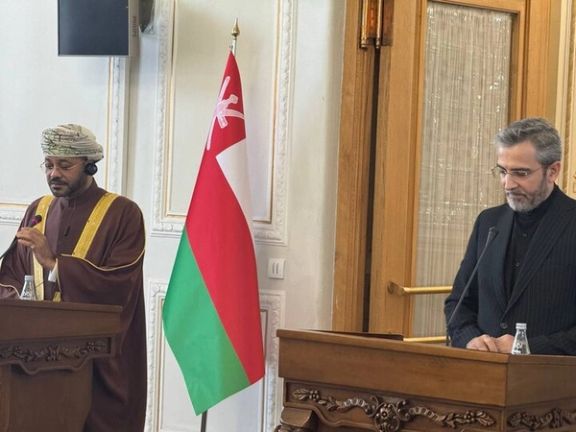
Oman’s foreign minister held talks with his counterpart in Tehran on Monday as Muscat takes a bigger role in regional negotiations.
The visit of Sayyid Badr bin Hamad al-Busaidi was framed as an expression of sympathy following the helicopter crash that killed Iranian President Ebrahim Raisi and several members of his delegation last week but Muscat has been hosting unofficial US-Iran talks in a bid to calm escalating conflict in the Middle East.
Following the sudden death of the president, the role of countries such as Oman amid the leadership vacuum become ever more valuable for Tehran.
Earlier this month, Axios revealed that Biden administration officials engaged in indirect negotiations with Iranian representatives in Oman to address regional concerns including the Iran-backed Houthis’ Red Sea blockade and Iran’s support for Hamas and Hezbollah amid the war in Gaza.
According to two sources cited by Axios, Brett McGurk, President Joe Biden’s chief Middle East adviser, along with Abram Paley, the acting US envoy for Iran, met with unnamed Iranian envoys to not only talk about regional tensions but also to delve into issues concerning Iran's advancing nuclear program.